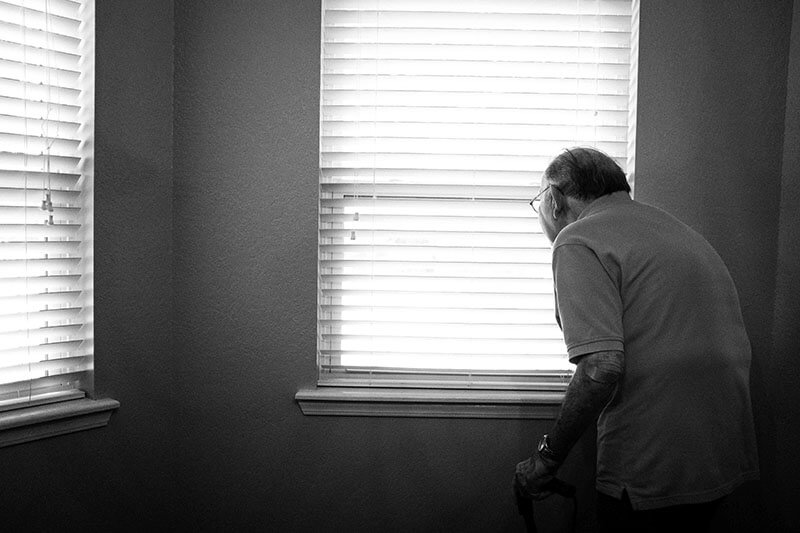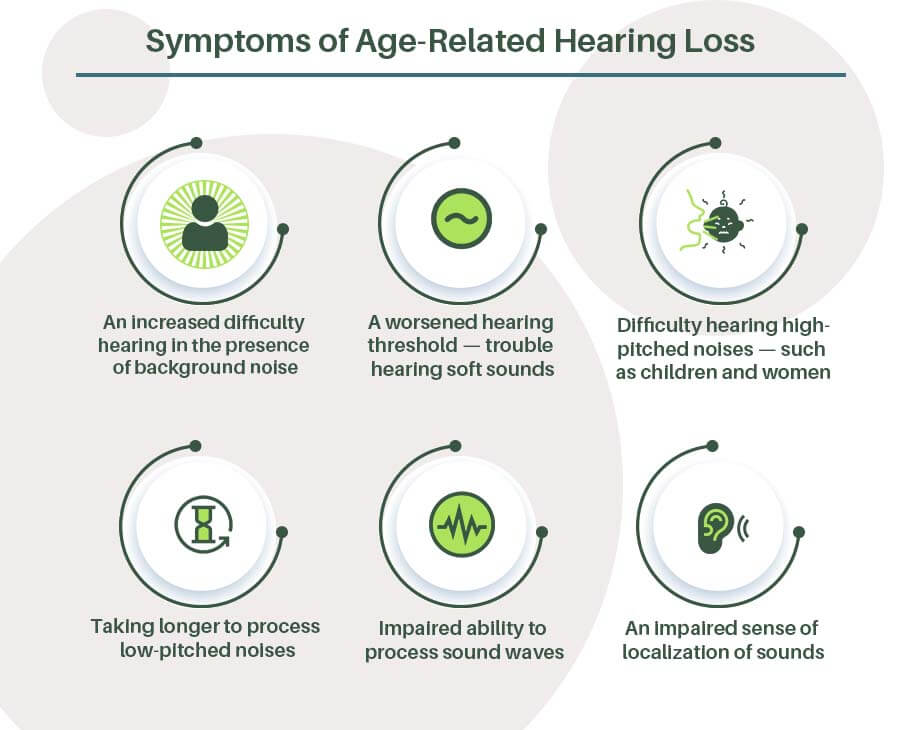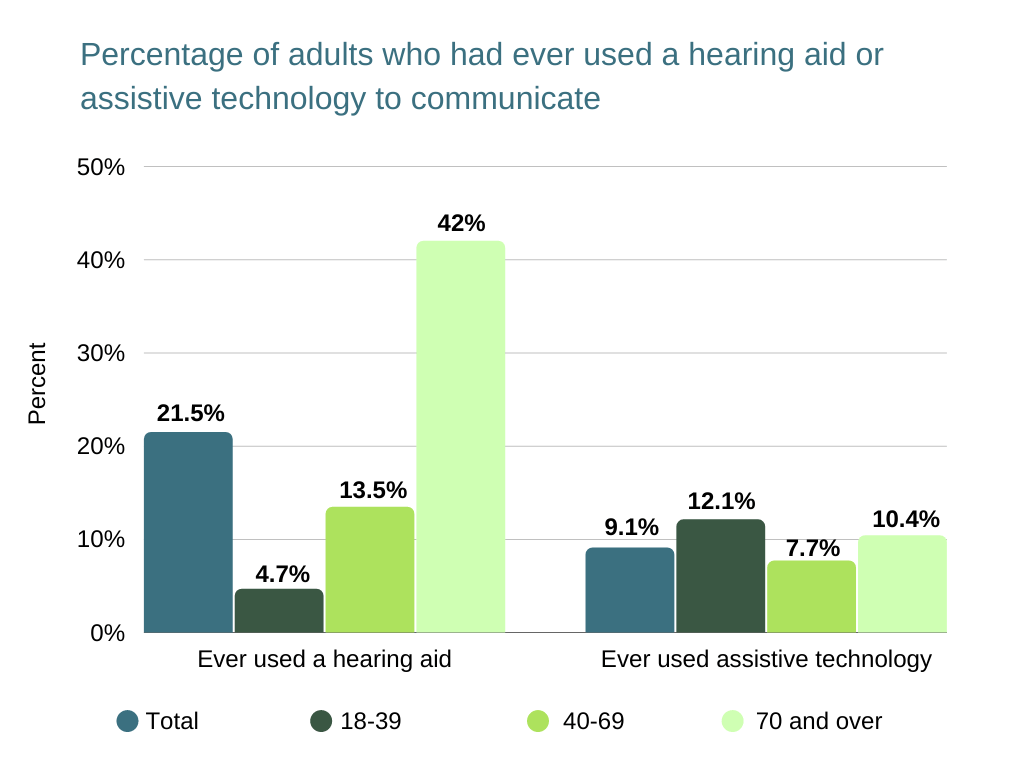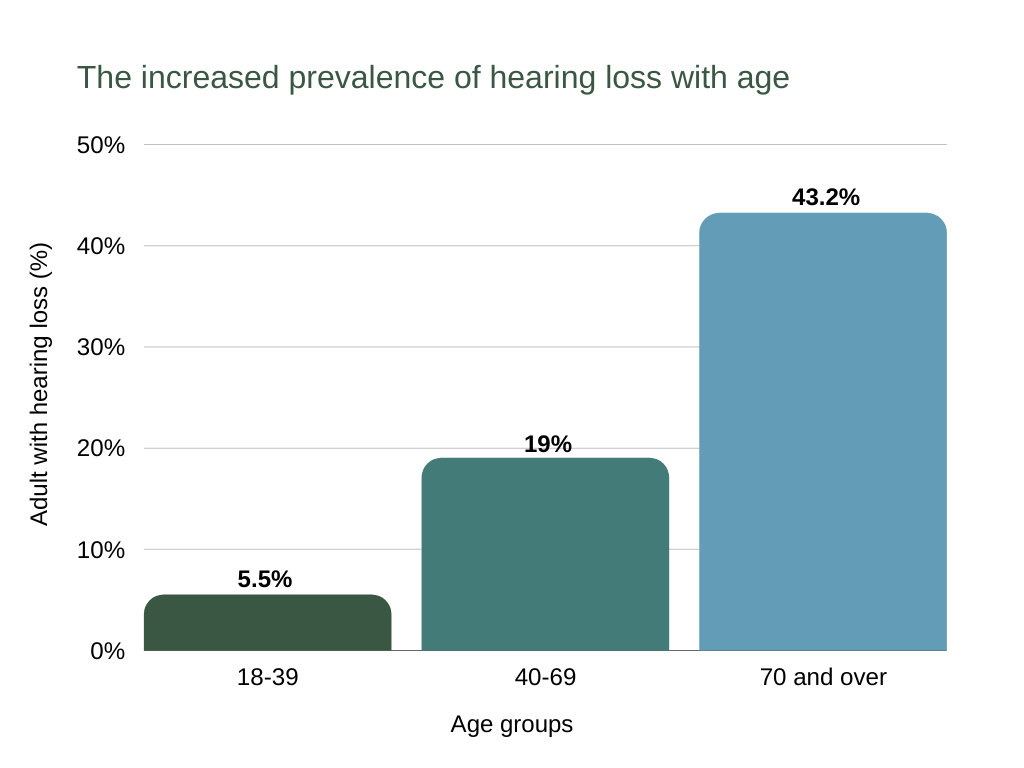You may have noticed that, over the years, it has become harder to hear conversations, and you’ve been turning up the TV or radio to ever-increasing volumes. Perhaps friends and family who are your own age don’t notice, but your children or grandchildren do.
In this situation, you may have age-related hearing loss, a common condition that grows in prevalence as we get older. So what causes the problem, and what can we do to treat it?
Key Takeaways: Age-Related Hearing Loss
- Age-related hearing loss involves degeneration of the sensory hair cells, nerves, or blood vessels of the inner ear, rather than issues to the middle ear or ear canal.
- The symptom profile includes an inability to hear high-pitched sounds and trouble understanding speech, particularly with background noise.
- Avoiding exposure to loud sounds, quitting smoking to reduce oxidative stress, and caring for your cardiovascular and metabolic health are the only current prevention strategies.
- Wearing hearing aids is the primary way to manage age-related hearing loss.
- Over-the-counter hearing aids are invaluable treatment options for older adults with hearing loss, as their greater accessibility prevents the social isolation caused by an inability to hear.
What Is Age-Related Hearing Loss?
There are several types of hearing loss, and age-related hearing loss belongs to the sensorineural hearing loss category. Here, the hair cells of the cochlea lose their numbers and function, so they cannot pick up sound waves as effectively.
There are five main subtypes, which physicians categorize by the signs of hearing loss, and these point to where the degeneration is at its worst.
First of all, sensory age-related hearing loss features sharp drops in certain areas of your hearing curve. This is the healthy, youthful curve of your hearing thresholds. It is caused by a loss of the hair cells in your cochlea, which turn sound vibrations into nerve impulses.
Neural hearing loss is caused by damage to the cochlear nerve cells and its nerve pathways, which looks like a downward slope on your hearing curve. In the “cochlear” type, however, there is no clear change to the parts of the inner ear.
There is also the metabolic type of age-related hearing loss, where the hearing curve is flat and blood vessels serving the cochlea are damaged. Finally, we have the mixed type, featuring a combination of all types of aging-related degeneration [1].
Why Do We Lose Our Hearing as We Get Older?
With age, the cochlea degenerates, just like almost all other parts of the body during the aging process. The other part of the inner ear, your auditory nerve, can lose function and structural integrity too.
New research shows that oxidative stress, or an inability to protect against it, is a likely cause of age-related hearing loss. In a 2020 study, mice with genetically high levels of NRF2 gene expression showed a lower degree of hearing loss compared to normal mice. However, the benefit was only seen in medium and low-pitch frequencies, not high-pitch tones [2].
Under the microscope, researchers could see that high NRF2 expression led to the maintenance of tissue integrity in the inner ear. Fewer hair cells were lost from the cochlea, keeping their hearing ability at a more youthful level.
The NRF2 gene is the “master switch” of many antioxidant and anti-inflammatory processes in the body, and can therefore protect our cells and tissues against age-related damage. Treatments that have a positive effect on NRF2 expression may turn out to be preventive therapies we can use to avoid hearing loss in the future.
Who Is Affected?
Age-related hearing loss becomes more likely as you get older. More than 40% of people over 70 have difficulty hearing, compared to around 5% of people under 40.
On average, the hearing threshold worsens by one decibel every year after the age of 50. With a loss of 25 decibels being the cutoff for hearing impairment, we can estimate that the average person will meet the criteria for age-related hearing loss at around 75 [3].
What percentage of those aged 70 and over do you think experience hearing loss?

Causes of Age-Related Hearing Loss
Several factors affect how early you experience age-related hearing loss, if you experience significant impairment at all.
The exact underlying causes of aging that lead to age-related hearing loss are still unknown, even though certain medications, excess noise exposure, genetics, and oxidative stress contribute. If you smoke, have a family history of hearing problems among older adults, are exposed to loud noises at work, or have taken chemotherapy drugs, you are at a higher risk [1].
Symptoms of Age-Related Hearing Loss

Age-related hearing loss features not only an increased difficulty hearing in the presence of background noise but also a worsened hearing threshold. This means you have trouble hearing soft sounds even when there is no other sound around you, such as a whisper or insect buzzing.
Your ability to hear high-pitched noises is affected the most, so you probably have difficulty hearing children, some women, and people with certain accents. Typically, you can hear low-pitched noises at a relatively normal level for many more years, but you may take longer to understand them.
Other symptoms of age-related hearing loss include an impaired ability to process sound waves. You may hear a sound, but it takes longer for you to understand what it is. Localization is impaired too, which is the ability to know where a sound is coming from [1].
Diagnosing Age-Related Hearing Loss
Age-related hearing loss is partially diagnosed by exclusion. If you are using ototoxic drugs, which include certain antibiotics, your hearing loss may be caused by them and not the aging process. Injury to the outer ear or middle ear, ear surgery, conductive hearing loss (such as a growth or ear wax blockage in the outer ear canal), and illnesses related to the ear must be ruled out, too.
Diagnostic tests typically start with the whisper test, where your doctor will whisper a series of numbers and ask you to repeat them. This can pick up the characteristic inability to hear softer sounds. More specialized testing includes the pure tone test and hearing in noise test (HINT). The pure tone test isn’t enough to diagnose age-related hearing loss alone.
Additionally, the difficulties with speech perception indicate speech audiometry tests in people with age-related hearing loss. It is a more functional type of test that reveals how much any potential hearing loss could have affected your ability to speak. For other communication disorders, such as those affecting auditory processing, more noise is often added [1].
If now isn’t the best time to see a hearing specialist in-person, an online hearing test can give you an idea of whether or not you have a hearing impairment, or how severe it is. Take your time to research the best online hearing tests, such as that offered by MDHearingAid.
How To Treat Age-Related Hearing Loss
You may be wondering, can hearing loss be reversed? Unfortunately, the only approved treatment for age-related hearing loss is to start wearing a hearing aid.

Source: https://www.cdc.gov/nchs/products/databriefs/db214.htm
It is best to see a healthcare provider for a complete assessment, as you may have an issue with your outer ear, ear drum, or middle ear that requires a different treatment. However, if you fit the symptom profile of age-related hearing loss, an over-the-counter (OTC) aid will likely help you with managing hearing problems.
MDHearingAid is a high-quality brand of OTC device that you can purchase for one or both ears (depending on your budget) after a simple online hearing test. The best models are VOLT+, AIR, and CORE.
The VOLT+ model is the superior option, as it is the only rechargeable and water-resistant MDHearingAid product. Your hearing problem doesn’t stop at the shore, so this allows you to wear it wherever you go. The CORE model difference is that it adapts to different settings on its own. Both protect you against loud noise, and help filter out background noise.
AIR is the more basic option, but like the other two models, it can silence feedback, minimize loud noise, and be tuned at home. You can change the volume controls whenever, wherever you need.
If you suspect other health conditions or have experienced sudden hearing loss, seek professional medical care. A cochlear implant should also be considered if hearing aids aren’t enough, or don’t work at all. This is the case in profound hearing loss, but severe hearing loss should still leave you with some residual hearing to benefit from an aid.
Preventing Age-Related Hearing Loss
Currently, the only known and recognized ways to prevent age-related hearing loss include the prevention of noise-induced hearing loss, quitting smoking, and seeking effective treatment for health conditions such as high blood pressure, heart disease, or diabetes [3].
Noise-induced hearing loss adds to the damage caused by normal aging, making you require a hearing aid sooner. Avoid long-term exposure to loud music, and protect yourself against work-related noise with hearing protection such as ear plugs.
So far, there is only early research into the prevention of age-related hearing loss. The drug rapamycin, which has shown anti-aging, life-extending effects in the lab, has now demonstrated the ability to significantly delay hearing loss.
However, rapamycin didn’t regenerate the inner ear, but instead protected remaining cells. Human clinical trials are still required, so this is not a recommendation to take rapamycin. It is also not a substitute for other ways to prevent gradual hearing loss, such as protection against loud noises or quitting smoking [4].
Living With Age-Related Hearing Loss
If you have age-related hearing loss, it’s important to avoid letting it impair your social life or prevent you from doing and experiencing the things you enjoy. As it is common for people to withdraw from everyday life as hearing worsens, age-related hearing loss is linked to a higher risk of cognitive impairment. Continuing to live life to the fullest is essential [5].
Assistive listening devices such as cell phone amplifying devices can be used alongside hearing aids if they aren’t enough on their own in that situation. You may also benefit from using text-to-speech technologies, including subtitles on your TV (especially at night when others are in bed!). And remember, there’s no shame in asking someone to speak louder.
FAQ
What are the most important things we need to know about age-related hearing loss?
What Are the Symptoms of Age-Related Hearing Loss?
The symptoms of age-related hearing loss include a blunted ability to hear high-pitched sounds, such as those in children’s voices or the top notes of a piano. Even with sounds you can hear perfectly, processing them doesn’t come as easily either, so you could take longer to understand what someone is saying or figure out the name of a song.
What Are the Most Common Types of Age-Related Hearing Loss?
The most common type of age-related hearing loss is a sensorineural hearing loss, caused by the degeneration of hair cells in the cochlea.
Can Age-Related Hearing Loss Be Reversed?
There are currently no approved treatments to reverse age-related hearing loss. Until then, hearing aids, cochlear implants, and lifestyle adaptations such as the use of subtitles are the only interventions available.
Is Hearing Loss a Normal Part of Aging?
In terms of commonality, hearing loss is a normal part of aging as the majority of people are expected to experience it. However, “normal” and “desirable” are not the same things, so it is best for your overall health and quality of life to seek out a quality hearing aid that can give you your old social life back.
Conclusion
Age-related hearing loss is a common complaint, caused by the loss of hair cells in the cochlea of your inner ear. It is not yet entirely preventable, but you can slow it down by avoiding exposure to loud noise and minimizing oxidative stress.
However, you don’t have to suffer in silence. Hearing aids are an effective treatment option, and you can now purchase OTC hearing aids if prescription devices are out of your budget or less convenient.
References:
- Kim, Tae Su, and Jong Woo Chung. “Evaluation of age-related hearing loss.” Korean journal of audiology vol. 17,2 (2013): 50-3. doi:10.7874/kja.2013.17.2.50
- Oishi, Tetsuya et al. “Activation of the NRF2 pathway in Keap1-knockdown mice attenuates progression of age-related hearing loss.” npj Aging and Mechanisms of Disease (2020), doi:10.1038/s41514-020-00053-4
- Feltner C, Wallace IF, Kistler CE, et al. Screening for Hearing Loss in Older Adults: An Evidence Review for the U.S. Preventive Services Task Force [Internet]. Rockville (MD): Agency for Healthcare Research and Quality (US); 2021 Mar. (Evidence Synthesis, No. 200.) Chapter 1, Introduction. Available from: https://www.ncbi.nlm.nih.gov/books/NBK569275/
- Altschuler, R. A., Kabara, L., Martin, C., Kanicki, A., Stewart, C. E., Kohrman, D. C., & Dolan, D. F. (2021). Rapamycin Added to Diet in Late Mid-Life Delays Age-Related Hearing Loss in UMHET4 Mice. Frontiers in Cellular Neuroscience, 15, 100.
- Loughrey, D. G., Kelly, M. E., Kelley, G. A., Brennan, S., & Lawlor, B. A. (2018). Association of Age-Related Hearing Loss With Cognitive Function, Cognitive Impairment, and Dementia: A Systematic Review and Meta-analysis. JAMA otolaryngology– head & neck surgery, 144(2), 115–126. https://doi.org/10.1001/jamaoto.2017.2513






Leave a Reply